Mile run

The mile run (1,760 yards[1] or exactly 1,609.344 metres, but considered by the IAAF to be 1,609.32 metres) is a middle-distance foot race.
The history of the mile run event began in England, where it was used as a distance for gambling races. It survived track and field's switch to metric distances in the 1900s and retained its popularity, with the chase for the four-minute mile in the 1950s a high point for the race.
In spite of the roughly equivalent 1500 metres race, the mile run is present in all fields of athletics and it remains the only imperial distance for which the IAAF records an official world record. Although the mile does not feature at any major championship competition, the Wanamaker Mile, Dream Mile, and Bowerman Mile races are among the foremost annual middle-distance races indoors and outdoors, respectively.
The current mile world record holders are Morocco's Hicham El Guerrouj with 3:43.13 and Svetlana Masterkova of Russia with the women's record of 4:12.56.
History
The distance of the English mile gained its current definition of 1,760 yards through a statute of the Parliament of England in 1593.[2] Thus, the history of the mile run began in England and it initially found usage within the wagered running contests of the 18th and 19th century. Such contests would attract large numbers of spectators and gamblers – so many that the activity became a professional one for its more-established participants.[3]
The mile run was at the heart of the divide between professional and amateur sports in the late 19th century. Separate world record categories were kept for amateurs and professionals, with professional runners providing the faster times. High-profile contests between Britons William Cummings and Walter George brought much publicity to the sport, as did George's races against the American Lon Myers. The mile run was also one of the foremost events at the amateur AAA Championships.[3] The categories remained distinct but the respective rise in amateurism and decline of the professional sector saw the division become irrelevant in the 20th century.[4]
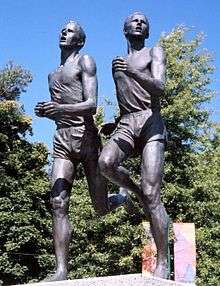
The mile run continued to be a popular distance in spite of the metrication of track and field and athletics in general. It was the 1500 metres – sometimes referred to as the metric mile – which was featured on the Olympic athletics programme. The International Amateur Athletics Federation formed in 1912 and ratified the first officially recognised world record in the mile the following year (4:14.4 minutes run by John Paul Jones).[5] The fact that the mile run was the only imperial distance to retain its official world record status after 1970 reflects its continued popularity in the international (and principally metric) era.[6]
The top men's middle distance runners continued to compete in the mile run in the first half of the 1900s – Paavo Nurmi, Jack Lovelock and Sydney Wooderson were all world record holders over the distance.[5] In the 1940s, Swedish runners Gunder Hägg and Arne Andersson pushed times into a new territory, as they set three world records each during their rivalry over the decade.[7] The act of completing a sub-four-minute mile sparked further interest in the distance in the 1950s. Englishman Roger Bannister became the first person to achieve the feat in May 1954 and his effort, conducted with the help of Chris Brasher and Chris Chataway, was a key moment in the rise of the use of pacemakers at the top level of the sport – an aspect which is now commonplace at non-championship middle and long-distance races.[8][9]
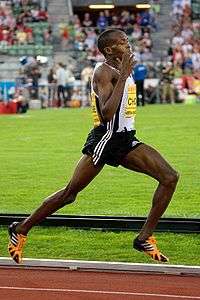
The 1960s saw American Jim Ryun set world records near the 3:50-minute mark and his achievements popularised interval workout techniques.[7] From this period onwards, African runners began to emerge, breaking the largely white, Western dominance of the distance. Kenya's Kip Keino won the mile at the 1966 British Empire and Commonwealth Games (which was among the last mile races to be held at a major multi-sport event).[10] Filbert Bayi of Tanzania became Africa's first world record holder over the distance in 1975, although New Zealander John Walker broke the record further a few months later to become the first man under 3:50 minutes for the event. The 1980s was highlighted by the rivalry between British runners Sebastian Coe and Steve Ovett, who improved the record five times between them, including two records at the Oslo Dream Mile race. Noureddine Morceli brought the mile record back into African hands in 1993 and Morocco's Hicham El Guerrouj set the current record of 3:43.13, which has stood since 1999.[5]
Mile run contests remain a key feature of many annual track and field meetings, with long-running series such as the Wanamaker Mile at the Millrose Games, Dream Mile at the Bislett Games, the British Emsley Carr Mile, and the Bowerman Mile at the Prefontaine Classic being among the most prominent. Aside from track races, mile races are also occasionally contested in cross country running and mile runs on the road include the Fifth Avenue Mile in New York City
Records
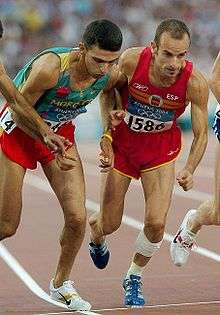
Outdoor
| Area | Men's | Women's | ||
|---|---|---|---|---|
| Time | Athlete | Time | Athlete | |
| World | 3:43.13 | | 4:12.56 | |
| Continental records | ||||
| Africa | 3:43.13 | | 4:16.71 | |
| Asia | 3:47.97 | | 4:17.75 | |
| Europe | 3:46.32 | | 4:12.56 | |
| North, Central America and Caribbean | 3:46.91 | | 4:16.71 | |
| Oceania | 3:48.98 | | 4:22.66 | |
| South America | 3:51.05 | | 4:30.05 | |
Indoor
| Area | Men's | Women's | ||
|---|---|---|---|---|
| Time | Athlete | Time | Athlete | |
| World | 3:48.45 | | 4:13.31 | |
| Continental records | ||||
| Africa | 3:48.45 | | 4:13.31 | |
| Asia | 3:57.05 | | 4:24.71 | |
| Europe | 3:49.78 | | 4:17.14 | |
| North, Central America and Caribbean | 3:49.89 | | 4:20.5 | |
| Oceania | 3:51.46 | | 4:24.14 | |
| South America | 3:56.26 | | 4:42.24 | |
- Updated 12 June 2011.[11]
All-time top 25
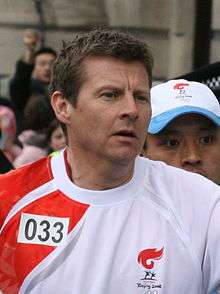
As of June 2016
Men
| Rank | Time | Athlete | Nation | Date | Place | Ref |
|---|---|---|---|---|---|---|
| 1 | 3:43.13 | Hicham El Guerrouj | | 7 July 1999 | Golden Gala | |
| 2 | 3:43.40 | Noah Ngeny | | 7 July 1999 | Golden Gala | |
| 3 | 3:44.39 | Noureddine Morceli | | 5 September 1993 | Rieti Meeting | |
| 4 | 3:46.32 | Steve Cram | | 27 July 1985 | Bislett Games | |
| 5 | 3:46.38 | Daniel Komen | | 28 August 1998 | ISTAF Berlin | |
| 6 | 3:46.70 | Vénuste Niyongabo | | 28 August 1998 | ISTAF Berlin | |
| 7 | 3:46.76 | Saïd Aouita | | 2 July 1987 | Helsinki | |
| 8 | 3:46.91 | Alan Webb | | 21 July 2007 | Brasschaat | |
| 9 | 3:47.28 | Bernard Lagat | | 29 June 2001 | Golden Gala | |
| 10 | 3:47.32 | Ayanleh Souleiman | 31 May 2014 | Eugene | [12] | |
| 11 | 3:47.33 | Sebastian Coe | | 28 August 1981 | Brussels | |
| 12 | 3:47.65 | Laban Rotich | | 4 July 1997 | Oslo | |
| 13 | 3:47.69 | Steve Scott | | 7 July 1982 | Oslo | |
| 14 | 3:47.79 | José Luis González | | 27 July 1985 | Oslo | |
| 15 | 3:47.88 | John Kibowen | | 4 July 1997 | Oslo | |
| 3:47.88 | Silas Kiplagat | | 31 May 2014 | Eugene | ||
| 17 | 3:47.94 | William Chirchir | | 28 July 2000 | Oslo | |
| 18 | 3:47.97 | Dahame Najem Bashir | | 29 July 2005 | Oslo | |
| 19 | 3:48.17 | Paul Korir | | 8 August 2003 | London | |
| 20 | 3:48.23 | Ali Saidi-Sief | | 13 July 2001 | Oslo | |
| 21 | 3:48.28 | Daniel Kipchirchir Komen | 10 June 2007 | Eugene | ||
| 22 | 3:48.38 | Andrés Manuel Díaz | 29 June 2001 | Rome | ||
| 23 | 3:48.40 | Steve Ovett | 26 August 1981 | Koblenz | ||
| William Kemei | 21 August 1992 | Berlin | ||||
| 25 | 3:48.50 | Asbel Kiprop | 7 June 2009 | Eugene |
Women
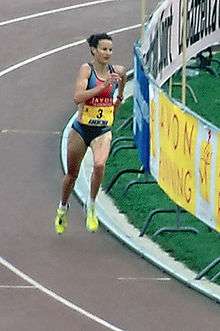
| Rank | Time | Athlete | Nation | Date | Location | Ref |
|---|---|---|---|---|---|---|
| 1 | 4:12.56 | Svetlana Masterkova | | 14 August 1996 | Zürich | |
| 2 | 4:13.31 i | Genzebe Dibaba | | 17 February 2016 | Stockholm (indoors) | [13] |
| 3 | 4:15.61 | Paula Ivan | | 10 July 1989 | Nice | |
| 4 | 4:15.8 | Natalya Artyomova | | 5 August 1984 | Leningrad | |
| 5 | 4:16.71 | Mary Slaney | | 21 August 1985 | Zürich | |
| 4:16.71 | Faith Kipyegon | | 11 September 2015 | Brussels | [14] | |
| 7 | 4:17.14 i | Doina Melinte | | 9 February 1990 | East Rutherford (indoors) | |
| 8 | 4:17.25 | Sonia O'Sullivan | | 22 July 1994 | Oslo | |
| 9 | 4:17.33 | Maricica Puica | | 21 August 1985 | Zürich | |
| 10 | 4:17.57 | Zola Budd | | 21 August 1985 | Zürich | |
| 11 | 4:17.75 | Maryam Yusuf Jamal | | 14 September 2007 | Brussels | |
| 12 | 4:18.20 | Sifan Hassan | | 11 September 2015 | Brussels | [14] |
| 13 | 4:18.23 | Gelete Burka | | 7 September 2008 | Rieti Meeting | |
| 14 | 4:19.12 | Laura Muir | | 9 June 2016 | Oslo | [15] |
| 15 | 4:19.30 | Gabriela Szabo | | 1 July 1998 | Bellinzona | |
| 16 | 4:19.41 | Kirsty McDermott | | 27 July 1985 | Oslo | |
| 17 | 4:20.23 | Gulnara Galkina | | 29 June 2007 | Moscow | |
| 18 | 4:20.34 | Shannon Rowbury | | 7 September 2008 | Rieti | |
| 19 | 4:20.35 | Lisa Dobriskey | | 7 September 2008 | Rieti | |
| 20 | 4:20.79 | Hassiba Boulmerka | | 6 July 1991 | Oslo | |
Notes
Below is a list of other times equal or superior to 4:15.00:
- Genzebe Dibaba also ran 4:14.30 (2016)
Youth age records
- Key
Incomplete information
Boys
| Age | Time | Athlete | Nation | Birthdate | Date | Location | Ref |
|---|---|---|---|---|---|---|---|
| 5 | 6:33.3 | Daniel Skandera | | 2 November 2007 | 23 July 2013 | Santa Rosa | |
| 6 | 6:29.9 | Joe O'Connor | | 1973 | [16] | ||
| 7 | |||||||
| 5:53.0 | Kevin Knox | | 16 December 1959 | 23 September 1967 | Wasco | ||
| 5:29.9 | Mike McKinney | | 19 September 1971 | Silver Spring | |||
| 8 | |||||||
| 5:36.6 | Mike Assumma | | 30 August 1963 | 3 June 1972 | Bakersfield | ||
| 5:33.1 | Darren O’Dell | | 9 June 1972 | Roseville | |||
| 9 | 5:19.1i | Mike Assumma | | 30 August 1963 | 24 February 1973 | Los Angeles | |
| 10 | 5:01.55 | Jonah Gorevic | | 21 August 2003 | 14 June 2014 | New York | [17] |
| 11 | 4:51.85 | Jonah Gorevic | | 21 August 2003 | 13 June 2015 | New York | [18] |
| 12 | 4:43.20 | Jonah Gorevic | | 21 August 2003 | 4 June 2016 | New York | [19] |
| 13 | 4:29.0 | Andrew Barnett | | 22 June 1955 | 1 June 1969 | London | |
| 14 | 4:19.73 | Ryan Silva | | 27 June 1995 | 12 June 2010 | Portland | |
| 15 | 4:08.8 | Jim Arriola | | 10 June 1958 | 22 April 1972 | Long Beach | |
| 16 | |||||||
| 4:06.7 | Barrie Williams | | 9 November 1955 | 22 April 1972 | Arcadia | ||
| 4:00.84 | Abdalla Abdelgadir | | 1987 | 15 August 2003 | Dublin | [20] | |
| 3:54.63 | Victor Torres | | 19 April 1989 | 14 June 2005 | New York | ||
| 17 | 3:50.90 | Hamza Driouch | | 16 November 1994 | 7 June 2012 | Oslo | [21] |
| 18 | 3:49.77 | Caleb Ndiku | | 9 October 1992 | 4 June 2011 | Eugene | [22] |
| 19 | 3:49.29 | William Biwott Tanui | | 5 March 1990 | 3 July 2009 | Oslo | [23] |
Girls
| Age | Time | Athlete | Nation | Birthdate | Date | Location | Ref |
|---|---|---|---|---|---|---|---|
| 7 | 6:05.1 | Kristina Wilson | | 5 December 1963 | 5 June 1971 | ||
| 8 | 5:59.1 | Anne Berry | | 23 August 1963 | 30 July 1972 | ||
| 9 | 5:32.2 | Renee Quigley | | 28 December 1960 | 6 December 1970 | ||
| 10 | |||||||
| 5:17.1 | Renee Quigley | | 28 December 1960 | 23 October 1971 | |||
| 5:14.7 | Sandra Beach | | 25 March 1973 | ||||
| 11 | |||||||
| 5:07.8 | Sydney Tullai | | 1 February 1999 | 22 January 2011 | Downey | ||
| 5:00.1 | Davida Jackson | | 12 June 1977 | ||||
| 12 | |||||||
| 4:57.51i | Claudia Francis | | 14 November 1993 | 12 March 2006 | New York | ||
| 4:54.4 | Carol Lantry | | 1964 | 22 May 1976 | |||
| 13 | 4:48.8 | Katharina Denz | | 9 September 1963 | 12 June 1977 | Los Angeles | |
| 14 | 4:40.1 i | Mary Decker | | 4 August 1958 | 16 March 1973 | Richmond | |
| 15 | 4:36.0 | Gunvor Hilde | | 13 November 1963 | 14 September 1979 | London | |
| 16 | 4:28.25i | Mary Cain | | 3 May 1996 | 16 February 2013 | New York | |
| 17 | 4:24.11i | Mary Cain | | 3 May 1996 | 24 Jan 2014 | Boston | |
| 18 | 4:24.10i | Kalkidan Gezahegne | | 8 May 1991 | 20 February 2010 | Birmingham | |
| 19 | 4:17.57 | Zola Budd | | 26 May 1966 | 21 Aug 1985 | Zurich |
References
- ↑ It has always been customary to give horizontal distances in yards and vertical distances in feet
- ↑ Mile (unit of measurement). Encyclopædia Britannica. Retrieved on 2011-06-12.
- 1 2 Bryant, John (2005). 3:59.4: The Quest to Break the 4 Minute Mile. Random House. ISBN 9780099469087.
- ↑ McMillan, Ken. "Classic weekend notebook: Running for a good cause". Retrieved 14 November 2016.
- 1 2 3 12th IAAF World Championships In Athletics: IAAF Statistics Handbook (p. 546, 549–50). IAAF. Retrieved on 2011-06-12.
- ↑ World Outdoor Records. IAAF. Retrieved on 2011-06-12.
- 1 2 Mile - Introduction. IAAF. Retrieved on 2011-06-12.
- ↑ 1954: Bannister breaks four-minute mile. BBC On This Day. Retrieved on 2011-06-12.
- ↑ Butcher, Pat (2004-05-04). Completely off pace. The Guardian. Retrieved on 2011-06-12.
- ↑ Commonwealth Games Medallists - Men. GBR Athletics. Retrieved on 2011-06-12.
- ↑ One Mile Records. IAAF. Retrieved on 2011-06-12.
- ↑ "Bowerman Mile Results" (PDF). www.diamondleague-eugene.com. 31 May 2014. Retrieved 1 June 2014.
- ↑ Mike Rowbottom (17 February 2016). "Dibaba and Souleiman break world indoor records in Stockholm". IAAF. Retrieved 18 February 2016.
- 1 2 "Mile Run Results" (PDF). sportresult.com. 11 September 2015. Retrieved 12 September 2015.
- ↑ "Mile Run Results" (PDF). static.sportresult.com. 9 June 2016. Retrieved 10 June 2016.
- ↑ http://trackinfo.org/SingleAgeRecords.html Single Age Records by Dominique Eisold
- ↑ Zaccardi, Nick (16 June 2014). "Fifth grader runs 5:01 mile, fastest ever for 10-year-old". Retrieved 14 November 2016.
- ↑ "11-year old Jonah Gorevic runs sub-five minute mile at world record speed". 26 June 2015. Retrieved 14 November 2016.
- ↑ McMillan, Ken. "Classic weekend notebook: Running for a good cause". Retrieved 14 November 2016.
- ↑ http://web.archive.org/web/20110629134819/http://www.iaaf.org/mm/document/competitions/competition/05/15/63/20090706014834_httppostedfile_p345-688_11303.pdf
- ↑ "2012 Bislett Games--Oslo Diamond League". Retrieved 14 November 2016.
- ↑ "2011 Prefontaine Classic Results". Retrieved 14 November 2016.
- ↑ "Search Mile History - Mile History". Retrieved 14 November 2016.
External links
- ↑ McMillan, Ken. "Classic weekend notebook: Running for a good cause". recordonline.com. Retrieved 2016-06-06.